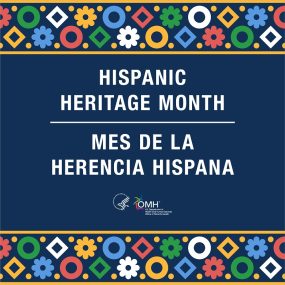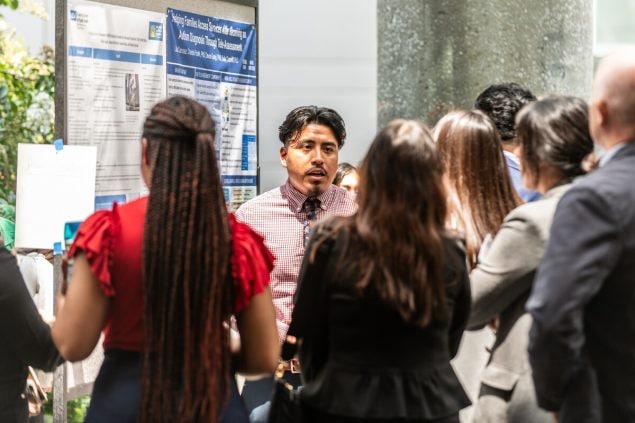Todos Somos, Somos Uno (We are All, We are One): Pathways to Equity
September 27, 2023

Hispanic Heritage Month aligns with the date of independence from Spain for many Latin American countries.
One of the greatest strengths of our country is its rich diversity. Each year, we celebrate National Hispanic Heritage Month from September 15 to October 15. During this month, we commemorate the diverse cultures and many contributions Hispanic or Latino* people make to U.S. society.
Read on to learn more about some of the factors that influence health for Hispanic and Latino people in the U.S. and its territories. Explore what CDC is doing to ensure Hispanic and Latino people have a fair and just opportunity to achieve their highest level of health. Share this information in your community!
The theme for the 2023 National Hispanic Heritage Month is Todos Somos, Somos Uno: We are All, We are One. This theme highlights that Hispanic and Latino people are both deeply connected to one another and to U.S. society as well as richly diverse. Hispanic and Latino people in the U.S. have ancestry from 21 Spanish-speaking or Latin American countries and territories. In 2022, approximately 1 in 5 people in the U.S. were Hispanic or Latino.
The conditions in which we are born, grow, work, live, and age shape our health. Hispanic or Latino people in the U.S. often face unfair differences in these conditions, which can sometimes lead to worse health.
Let’s take a closer look at just one of the conditions that impacts our health – work. To maintain good health, people need steady incomes that allow them to meet their health needs. Hispanic and Latino people play an important role in the U.S. economy, but are less likely to have higher-earning jobs and earn fair pay when compared with non-Hispanic or Latino people. Hispanic or Latino people are also less likely to have access to employer-sponsored benefits like health insurance coverage and paid sick leave, and may struggle to access quality and affordable healthcare.

A more diverse health workforce can help advance progress toward health equity.
Hispanic or Latino people in the U.S. are underrepresented in healthcare and related health fields and face challenges to receiving the post-secondary education and training needed to enter these fields. A diverse health workforce can lead to more culturally competent care, more effective public health programming, and better health outcomes for all people.
For over 35 years, CDC has sponsored public health education and training opportunities for Hispanic or Latino students and young professionals. Some of the current CDC education and professional development efforts with a focus on Hispanic and Latino people in the U.S. and its territories include:
- The CDC John R. Lewis Undergraduate Public Health Scholars Program and the Dr. James A. Ferguson Emerging Infectious Diseases Fellowship Program

Lewis Scholars and Ferguson Fellows share their public health projects at the 2023 Summer Showcase at CDC.
Through the Lewis Scholars and Ferguson Fellowship Programs, CDC funds seven academic and public health institutions who provide undergraduate and graduate students from across the country the opportunity to explore public health through hands-on training, public health project placement, mentorship, and professional development. Over the last ten years, 1 in 5 program participants were Hispanic or Latino and were recruited from across the U.S. and its territories.
- The Public Health Associates Program (PHAP)
In this competitive, two-year, paid training program with CDC, associates are assigned to state, tribal, local, and territorial public health agencies and nongovernmental organizations, and work alongside other professionals across a variety of public health settings. CDC promotes PHAP to potential Hispanic and Latino applicants through a partnership with the Hispanic Association of Colleges and Universities and the Organization of Hispanic and Latino Allies in Health.
Work and workforce diversity are just two of the many factors that influence health for Hispanic and Latino people. CDC is committed to advancing health equity for Hispanic and Latino people in the U.S. by addressing social determinants of health.
We all have a role to play. Learn more about health for Hispanic or Latino people in the U.S. and its territories.
- FastStats – Health of Hispanic or Latino People
- Hispanic or Latino Vital Signs Report
- Vital Signs: Leading Causes of Death, Prevalence of Diseases and Risk Factors, and Use of Health Services Among Hispanics in the United States — 2009–2013 (cdc.gov)
- Trends in Hispanic or Latino Population Health, United States
- Hispanic or Latino People and Cancer
- Hispanic or Latino Health Disparities in HIV, Viral Hepatitis, STDs, and TB
- Unfair and Unjust Practices and Conditions Harm Hispanic and Latino People and Drive Health Disparities
Explore some of the ways CDC is addressing the conditions and systems that influence health for Hispanic and Latino people.
- Health Equity in Action
- Health Equity
- Racism and Health
- Racial and Ethnic Approaches to Community Health
- Community Health Worker Resources
- Diabetes Self-Management Education and Support/en español
- Dengue
CDC offers extensive web content in Spanish through Centros para el Control y la Prevención de Enfermedades CDC.
Share these resources in your community!
CDC’s Office of Health Equity recognizes Hispanic Heritage Month as part of our anniversary. We’re celebrating 35 years of “baking” health equity into our public health work. “Baking in” health equity means that health equity is foundational in our work, and the key ingredient to our vision that all people have the opportunity to attain the highest level of health possible.
* We use “Hispanic and Latino” throughout this article to represent both Hispanic and Latino people. “Hispanic” refers to people who speak Spanish or who are from Spanish-speaking countries, including Spain. “Latino” refers to people descended from Latin American countries. While these populations are distinct, they face many of the same inequities in the U.S.
- Centros para el Control y la Prevención de Enfermedades CDC
- The HHS Office of Minority Health’s Commitment to Advancing Language Access – Blog Post
- Executive Order On Advancing Racial Equity and Support for Underserved Communities Through the Federal Government
- National Hispanic Heritage Month (hhs.gov)
- Hispanic/Latino – The Office of Minority Health (hhs.gov)
- Hispanic/Latino Health in the United States (hhs.gov)
- Home – Hispanic Association of Colleges and Universities (hacu.net)